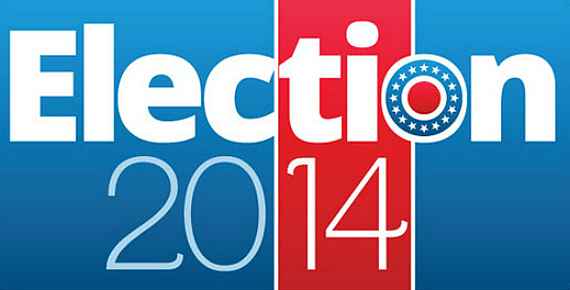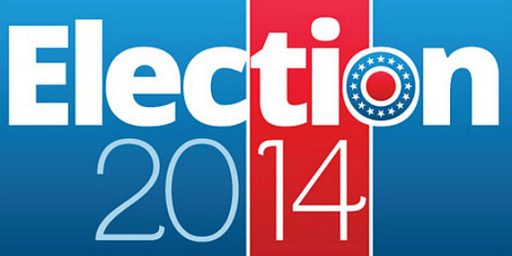GOP Likely To Take The Senate, Retain The House, Maintain The Status Quo In The States
The GOP has a good chance of taking the Senate in 2014, but it will be by a narrow margin.
The latest analysis from The Washington Post finds that there’s a very good possibility that the Republican Party will gain the six seats necessary to gain control of the Senate in the midterms:
The decision by Sen. John Walsh (D-Mont.) not to seek election in November in the wake of a plagiarism scandal is the latest piece of good news for Republicans as they strive to take control of the Senate in less than three months.
Walsh’s departure from the race came in the same week that two Republican senators — Pat Roberts in Kansas and Lamar Alexander in Tennessee — defeated tea party challengers in primary fights, ensuring that every GOP senator seeking reelection would be the party’s nominee.
These past seven days typified the fates of the two parties this election cycle. Democrats have been hit by retirements in tough states — Montana, West Virginia, South Dakota and, to a lesser extent, Iowa — and Republicans haven’t nominated the sort of extreme candidates who lack broader appeal in a general election.
Those realities — along with a national playing field in which a handful of incumbent Democrats are defending Republican-leaning seats in places where President Obama is deeply unpopular — have made a GOP takeover a better-than-50/50 proposition.
Walsh’s decision not to run takes what was an uphill climb for Democrats and turns it into something close to a no-chance race. (A committee of Democrats will pick the party’s nominee by Aug. 20.) Montana joins the contests for open seats in West Virginia and South Dakota in that category, meaning that, unless something drastically changes, Republicans should have three takeovers in the bank — a nice head start going into Election Day.
That means the party needs three more pickups to gain the Senate majority. And it has more than enough seats in play to do it. Democratic-held seats in Alaska, Arkansas, Colorado, Iowa, Louisiana and North Carolina are competitive at this point. (Races in Michigan, New Hampshire and Oregon seem to be moving in the Democrats’ direction.)
Of that group, the seats in Louisiana and Arkansas seem to be the most endangered for Democrats, in large part because of the strongly Republican nature of both states.
Sen. Mark Pryor (D-Ark.) has run a very good campaign, while Rep. Tom Cotton (R) has underwhelmed somewhat. (To be fair, Cotton, a freshman member of Congress, entered the race with impossibly high expectations.) And yet, the public polling in the contest gives Cotton a narrow edge. (Internal polling shows Pryor in a slightly stronger position.)
In Louisiana, Sen. Mary Landrieu (D) has a wide lead over Rep. Bill Cassidy (R) as well as two other Republicans in the contest. But Landrieu seems unlikely to win more than 50 percent of the vote Nov. 4, and if she doesn’t, she will face a runoff Dec. 6 against the second-place vote-getter, who is likely to be Cassidy. Head-to-head polling between Landrieu and Cassidy gives the slightest edge to the challenger.
Iowa, Colorado and North Carolina fit comfortably into the next tier of vulnerability. Iowa State Sen. Joni Ernst (R) has run a terrific campaign for the seat of retiring Sen. Tom Harkin (D) and has been aided by the stumbles of Rep. Bruce Braley (D). Republicans’ last-minute recruiting coup in Colorado landed them Rep. Cory Gardner, although Sen. Mark Udall (D) hasn’t been caught by surprise and is working hard to paint the GOP congressman as extreme on social issues. The North Carolina contest is the quietest close race in the country; Sen. Kay Hagan (D) isn’t well-defined as a candidate, but she has endured millions of dollars in spending by conservative groups relatively well. State House Speaker Thom Tillis performed well in the Republican primary, but his stewardship of the chamber will be a major issue this fall.
Then there is Sen. Mark Begich (D-Alaska), who has run a solid campaign and is well-known and liked in the state. Republicans have a late primary — on Aug. 19 — and former U.S. attorney Dan Sullivan is expected to emerge with the party’s nomination. Early polling gives Begich a slight lead, but Sullivan remains relatively unknown and would seem to have room to grow.
Nate Silver came to the same conclusion in his most recent projection, which was released before Walsh had dropped out of the race:
If Americans elected an entirely new set of senators every two years — as they elect members of the House of Representatives — this November’s Senate contest would look like a stalemate. President Obama remains unpopular; his approval ratings have ticked down a point or two over the past few months. But the Republican Party remains a poor alternative in the eyes of many voters, which means it may not be able to exploit Obama’s unpopularity as much as it otherwise might.
Generic congressional ballot polls — probably the best indicator of the public’s overall mood toward the parties — suggest a relatively neutral partisan environment. Most of those polls show Democrats with a slight lead, but many of them are conducted among registered voters, meaning they can overstate Democrats’ standing as compared with polls of the people most likely to vote. Republicans usually have a turnout advantage, especially in midterm years, and their voters appear to be more enthusiastic about this November’s elections. Still, the gap is not as wide as it was in 2010.
The problem for Democrats is that this year’s Senate races aren’t being fought in neutral territory. Instead, the Class II senators on the ballot this year come from states that gave Obama an average of just 46 percent of the vote in 2012.1
Democrats hold the majority of Class II seats now, but that’s because they were last contested in 2008, one of the best Democratic years of the past half-century. That year, Democrats won the popular vote for the U.S. House by almost 11 percentage points. Imagine if 2008 had been a neutral partisan environment instead. We can approximate this by applying a uniform swing of 11 percentage points toward Republicans in each Senate race. In that case, Democrats would have lost the races in Alaska, Colorado, Louisiana, Minnesota, New Hampshire, North Carolina and Oregon — and Republicans would already hold a 52-48 majority in the Senate.
It therefore shouldn’t be surprising that we continue to see Republicans as slightly more likely than not to win a net of six seats this November and control of the Senate. A lot of it is simply reversion to the mean.2 This may not be a “wave” election as 2010 was, but Republicans don’t need a wave to take over the Senate.
Other analysts are basically reaching the same conclusion right now, namely that there are few signs that 2010 will be a wave election in the manner that 2006 and 2010 were, but the factors influencing the election at this point still point to a very favorable environment for Republicans in November. President Obama’s job approval, for example, both overall and in specific areas such as the economy and foreign policy remains low and is likely to stay that way for the next three months. While the Generic Congressional Ballot continues to slightly benefit Democrats, it’s worth noting that the gap between the parties is smaller than it has been in the past and that the General Ballot prior to the 2010 elections was not showing a massive Republican wave until we got much closer to Election Day. As I’ve noted before, the Republicans are also in a strong position here thanks to the fact that the Democrats are defending far more vulnerable seats than the GOP is being required to. Most specifically, there are seven Democratic incumbents or open seats currently held by a Democrat up for election year. By contrast, there is only one Republican incumbent running in a state that President Obama won in 2012, and that seat, held by Susan Collins of Maine, is going to stay Republican regardless of what happens in the rest of the country. There are vulnerable Republicans, of course, in Kentucky and Georgia, but in both case it looks as though the Republican candidate, Mitch McConnell in Kentucky and David Perdue in Georgia, will be able to pull out a victory absent some massive mistake on their part. At the same time, it now seems apparent that other states that seemed as though they could have been GOP pickups are pretty much out of reach. Jeff Merkley has a seemingly insurmountable lead over Monica Wehby in Oregon, for example, and Jeanne Shaheen is polling quite well against Scott Brown in New Hampshire. Those last two states are examples of why it’s unlikely that we’ll see a wave election this year. The GOP is going to do well most likely, but this election doesn’t seem to be a 1994, 2006,or 2010. Republicans would need to win six of the seven vulnerable seats, or perhaps pick up a seat in a state like Iowa or Michigan where the GOP nominee seems to be polling much better than expected, and hold on to those two seats to get the 51 votes needed for a Senate majority. This does not include the possibility that someone like Angus King or Joe Manchin might end up deciding to caucus with the GOP when it comes time to vote in the leadership elections. At this point in time, the probability that they’ll do so, while not certain by any means, certainly seems to be more likely than not.
While the fate of the Senate remains up in the air, there’s really no question about what’s likely to happen in the House of Representatives. Notwithstanding public statements by House Democratic Leaders such as Nancy Pelosi and Steny Hoyer, there doesn’t seem to be any realistic chance that control of that body will change in November. This is due to a number of factors ranging from the redistricting advantages the GOP won out of the 2010 Census, the apparently lack of good candidates on the Democratic side, and the fact that there simply are not as many potentially “flippable” seats this year as there were in previous midterms where party control changed in the House. Republicans are so confident of their majority, in fact, that they are talking about increasing the number of seats that they hold in the House to as many as 245, although as Kyle Kondik points out that is much easier said than done. More likely than not, we’re likely to see a few seats change hands, probably in favor of the Republicans, but nothing noteworthy out of the House elections this time around.
On the state level, things are mixed for both parties. Republicans are defending all of the Governor’s races that they won in 2010, and currently find themselves in tight races in states such as Wisconsin, Michigan, Florida, Georgia, and Kansas. At the same time, there are also Democratic incumbents who find themselves vulnerable in Colorado, Connecticut, and Illinois. Two Republicans, Tom Corbett in Pennsylvania and Paul Le Page in Maine, seem to be headed to certain defeat, although LePage may be saved by the fact that he once again faces a three-way race just as he was in 2010. At the end of the night on Election Day, the GOP will probably see some Gubernatorial losses but will still end up with the majority of Governor’s mansions for the next four years. On the legislative level, it does not appear that we will see any significant changes from the status quo, which benefits Republicans.
On balance, then, 2014 is shaping up to be a good year for Republicans, but not the kind of spectacular one they saw in 2010. Obviously, that assessment could change over the next three months.







INPEACH!!!!!!!!!!!!!!11111111
I think we will see three more months of good economic news, and some good Obamacare news. I’m pinning my hopes on that for saving the Senate for the Democrats.
Obama needs to make sure he has plenty of ink for his veto pen.
It will be interesting to see if Republicans work with the President…or continue with their reflexive obstinateness.
The major insurers are reporting enrollment numbers 20-30% less than the 8 mm number would suggest. High premiums and “you can’t keep your doctor” are cited as the reasons. Obamacare seems a weak reed to lean on.
As for the economy……..you are kidding, right?
I wouldn’t expect Cory Gardner to beat Mark Udall….
Cory Gardner, a one-time supporter of a personhood amendment, is extreme on social issues. That stuff plays less and less in these parts.
In fact, it may come down to who’s more libertarian (strangely enough) and Udall’s got Gardner beat on that.
This is good news indeed for the party that was willing to leverage their agenda (primarily the defunding or repeal of ACA) into a possible default on American debt securities.
The ‘feel good story’ of the year.
Amongst all the changes that will come between now and Election Day, there is one certainty: stonetools will be here on November 3rd to declare victory for the Democratic Party – even though the election isn’t until the next day.
I still don’t think the GOP retakes the senate outside of some epic stupidity on the part of Onama or the Democrats.
I think the GOP picks up some seats but just not convinced they win enough to take the senate and if they do it won’t be much of a majority and while I would like the GOP to take over I don’t particularly want McConnell as majority leader.
House isn’t changing hands and I’m not sure the mix changes much-just seems like most house seats are uncompetitive this year.
Considering how the Republicans always underpunch their class, I suspect that come Nov. 2014 that Harry Reid will still be the majority leader in the Senate. The Meida has not picked out the weakest Republican candidates to cull from the herd. Until that happens nothing else is going to happen.
@C. Clavin:
No, I think it’s going to be really depressing. They’ll pass a Koch Bros wish list, Obama will veto, and they’ll impeach for the veto and numerous other acts of governing while black.
@Guarneri:
Er, yes the economy. :
Take a look that , son. That’s data. D.A.T.A. I know you right wing trolls are unfamiliar with that concept, like you are with mathematics and science.Read up about it and get back to me. (OK, maybe reading is a problem here too).
I won’t even bother with your link-free assertion about the ACA. Looks like obvious right wing anti ACA boilerplate. The hard core right wing is still stuck in the DENIAL phase of the Five Phases of Grief. I expect it will be there for a while.
@edmondo:
Heh. Thread bookmarked for later reference. How’s the Romney Presidency coming along, mate?
@stonetools:
Yeah thank God Romney lost, otherwise we might have gone back to Iraq and started saber-rattling in the Ukraine. President Obama saved us from those mistakes.
@edmondo: When Romney said he thought Russia was our greatest geopolitical challenge, do you have any reason to think he wasn’t lying? Like he did about everything else?
@edmondo:
Since had Romney won, we might have troops in Iran, I’m OK with our present status. Troll harder, mate.
So we’re “saber rattling in Ukraine”, eh? You must have Obama Derangement Syndrome kool aid on constant intraveneous drip.
@gVOR08:
Though I believe you’re right that it will be way too much to expect good governance, the Koch Bros wish list with vetoes could end up being better for the country in the long run. The Republicans could be passing bills which make clear what kind of country they really want and put the lie to their rhetoric that they care about the middle class and the poor, while Obama would be able to save us from the worst of it with his pen. That could be clarifying for those muddled independents out there come future votes.
OTOH, as the economy continues to improve as a result of Obama’s policies over the balance of his term, the Republicans will not be shy about claiming credit for it.
@edmondo:
What news have you been reading? All I’ve seen is bombast and posturing.
@Guarneri:
ACA is working despite the fact that nearly 30 Republican-dominated states (governor and legislature) have elected to not implement ACA.
The economy? Well, we’ve had slow steady growth in employment and GDP for over 54 months since the 2007-2008 financial crash and subsequent Great Recession. I realize that that doesn’t square up with conservative talking points, but it is an empirical and verifiable fact.
@gVOR08:
They won’t make it past the filibuster.